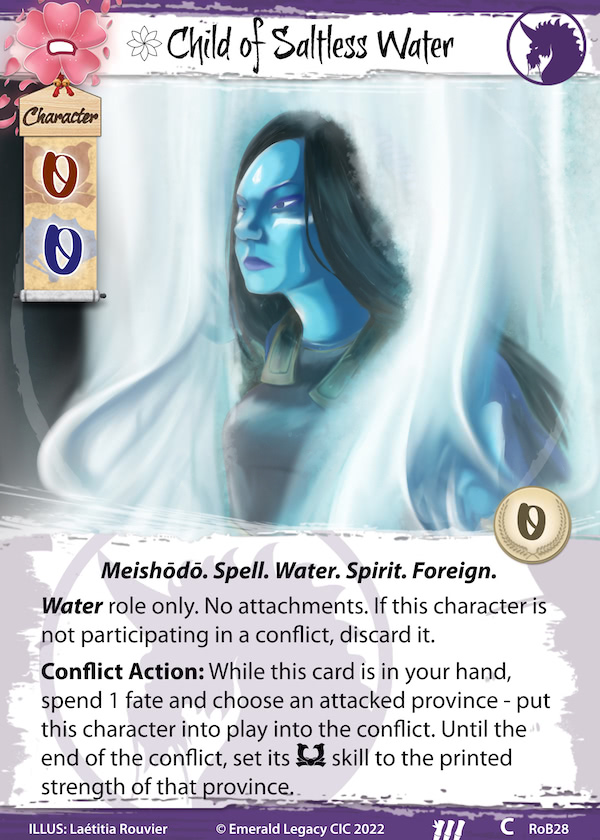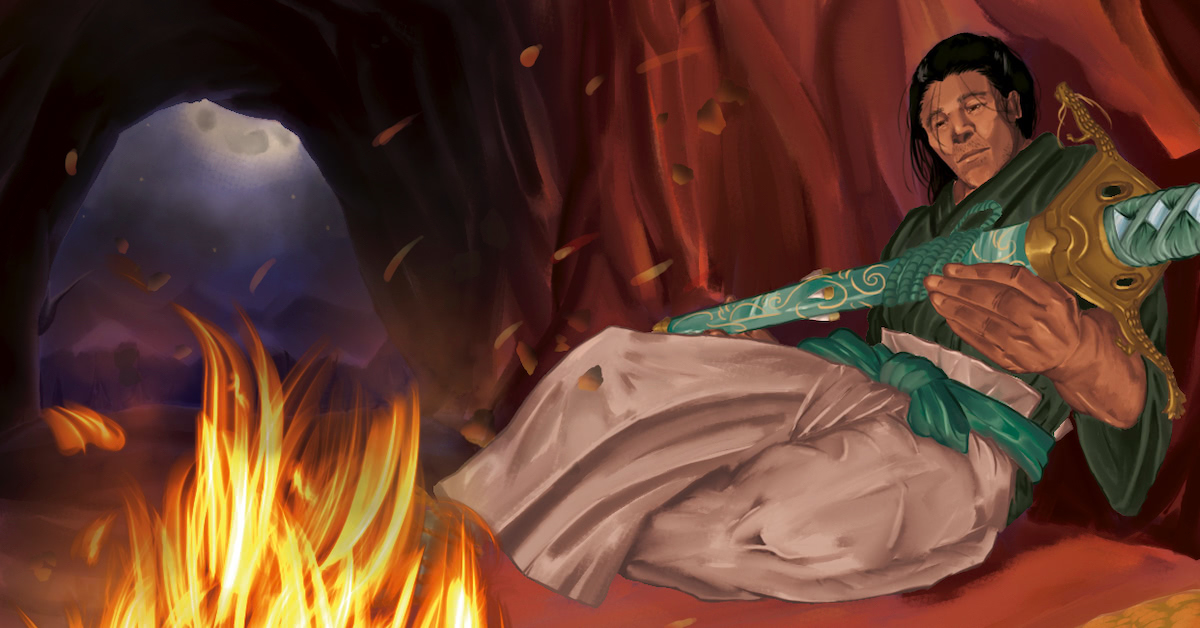Hello again from the Emerald Legacy team! Today we bring you three more spoilers – buffed cards this time! Our playtesters have once again stepped up and delivered us some fantastic insight into the new cards. We hope you enjoy!
Fight to Win – Zarzuckett

A big hole in the Crane toolbox is characters with abilities that help you win conflicts, especially among their lower cost characters. In looking at these sorts of characters in other factions (for example, Hida Guardian and Ethereal Dreamer), an obvious comparison can be made to the Asahina Artisan as being that sort of character for Crane. Historically, the Artisan has a hard time finding space in a deck due to being not impactful enough for the restrictions imposed on it, and so an improvement was made to the card to give you Asahina Diviner.
Rather than making it a flat +3/+3, we wanted to try a more interesting effect, and continue exploration of the design space of glory manipulation in Crane that was started by Dutiful Assistant. By being able to target any character, the Diviner can help you win conflicts by powering up your honored characters or powering down your dishonored characters and should be able to help even in games where you struggle to keep characters honored. We hope that by providing more access to glory manipulation, Crane decks looking to synergize with Glory can be more successful and that cards like Preeminent Decree or Sanguine Mastery are able to be re-evaluated in a new light.
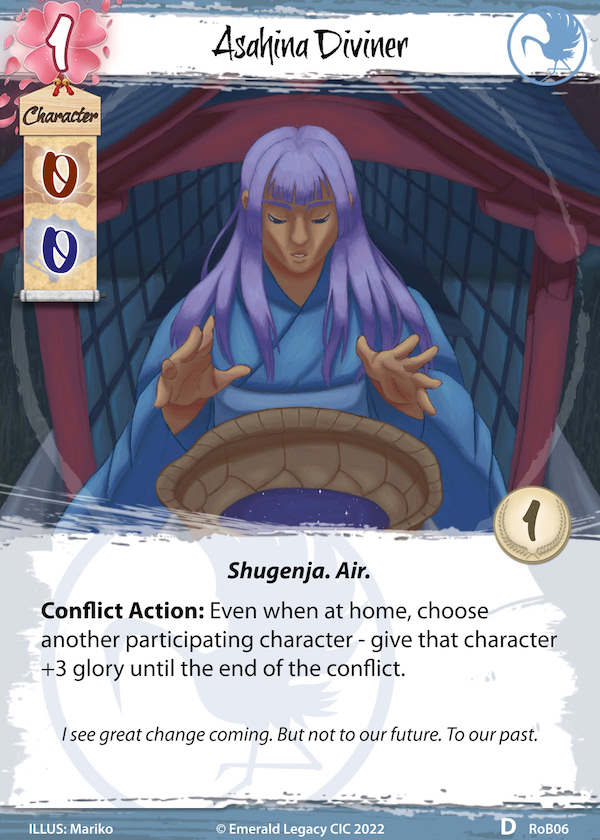
Removing the Hurdles – Workerbee

Unquestioned Heritage is one of those cards that look interesting on paper but end up with just one too many hoops you have to jump through. The air ring requirement means the card is dead in most situations where it could have been useful, especially because Dragon decks rarely care about the air ring at all. Therefore, removing the air ring requirement was the first step we took to make Unquestioned Heritage playable and playtesting indicates that it pretty much fixed the card without breaking it.
Hidden Lineage is with no doubt a more versatile tool. You can use it to move negative attachments like Cloud the Mind off your important character. You can use it to save an expensive attachment like Twin Sister Blades or Sashimono on a character that will leave play this round. You can move around ability-granting attachments like Duelist Training, Take Up Command or Self-Understanding to get an additional activation on another character. Hidden Lineage isn’t restricted to a specific action window, so its uses are varied and you can make some cool plays with it, like playing an attachment from your discard pile with Inventive Mirumoto before moving it to a more significant character. I personally think it’s really nice to have access to a bit of attachment utility in the designated “Attachment Clan” and I’m super excited to read about the plays you manage to pull off with it.
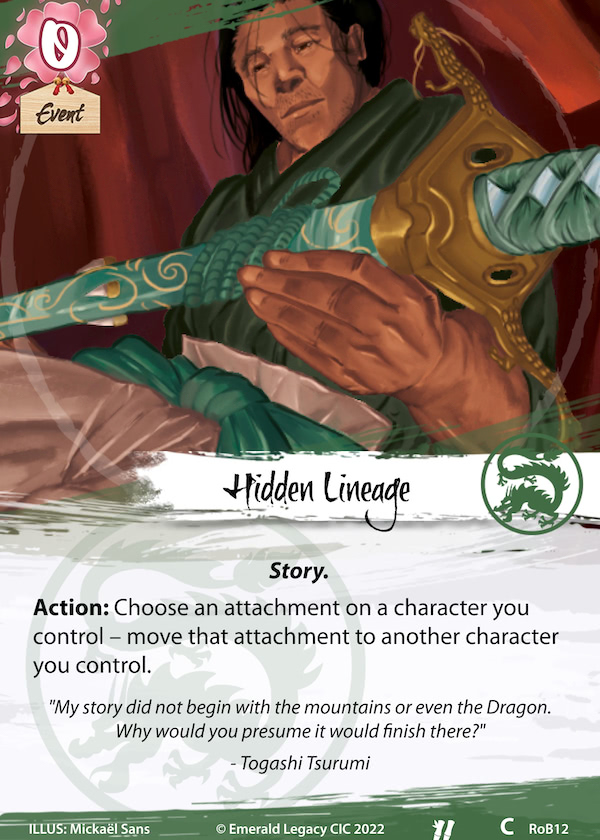
Strength of Spirit – lifeingodmode
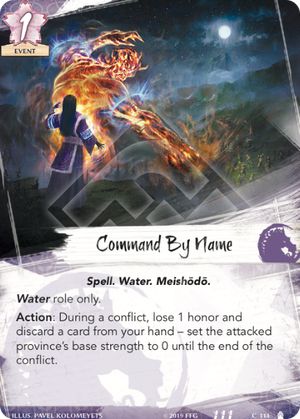
Command by Name usually competes for top slot in lists of the worst events in the game – for four resources plus a generally undesirable role lock, you set the attacked province’s printed strength to zero. Province strength reduction effects rarely see play because cards that increase your skill are simply more useful, helping you not just break provinces, but win conflicts, usually both on defence and attack. This card has been the source of much salt in the clan, despite the extraordinarily evocative art. Child of Saltless Water tries to take the same sort of effect, tied to province strength, but make it flexible enough to be played. As is appropriate for the military focus of the Unicorn clan, the destructive power of the elemental spirit – drawing its strength from the waters of the province itself – is limited to military skill. However- the card, being a conflict character rather than a military buff event, can be put into play in political conflicts for no skill, where it could be the target of Speak to the Heart or Shinjo Atagi, for example.
Being a character rather than event means playing the card cannot be cancelled. And having no cost means it cannot be assassinated. However, as it is unique only one can enter each conflict at a time. Moreover, the static text means the elemental power will evaporate and the character be discarded if it is sent home from the current conflict, such as by a Student of the Tao. Unlike normal conflict characters it can never be played to initiate a conflict, cannot hold attachments and – in military conflicts – can never have its skills boosted by events such as Banzai!. You pay 1 Fate for usually 4 military skill, but that is all that you can get, making it an efficient but risky lone blocker. It also cannot be played with extra fate to hold a Command the Tributary.
On attack it offers Unicorn far less power than eg. Unleash the Djinn, but at a much lower cost. Compared to other role locked cards it is less of a build-around or high-impact play than eg. Sanguine Mastery, Scouted Terrain or Forebearer’s Echoes but the flexibility of it being a character offers possibilities in the right decks beyond its military skill. Although it lacks the cavalry trait, limiting its usefulness in HMT, Child provides another temporary body for cards such as Press of Battle and Flank the Enemy, similar to Force of the River. And its uniqueness pairs extremely well with Weight of Duty in East Wind decks, providing a surprise 1-cost sacrificial body to allow the province to target any character.
Despite its Foreign and Meishōdō traits, as it is put into play and not played, it will not trigger Worldly Shiotome or Iuchi Shahai. Its set-skill ability also will not combo with Along the River of Gold. However, as a Spell, it can be drawn to hand by Shrine Maiden or Empty City Archivist and may perhaps be considered in Phoenix decks, or Unicorn decks splashing Phoenix. Good Water-role cards are already found in Lion, Scorpion and Crab, and any clan wanting to use Weight of Duty more effectively might look to this character. More aggressive Crane decks in Mioko’s Song might also consider this as a surprise pump in military, perhaps alongside Captivating Story for political conflicts: the stronghold works well with cheap temporary characters, especially those that leave play in the middle of the Conflict Phase, and Song will let Child recoup its cost immediately and then generate the Courtesy Fate at the end of the conflict.
